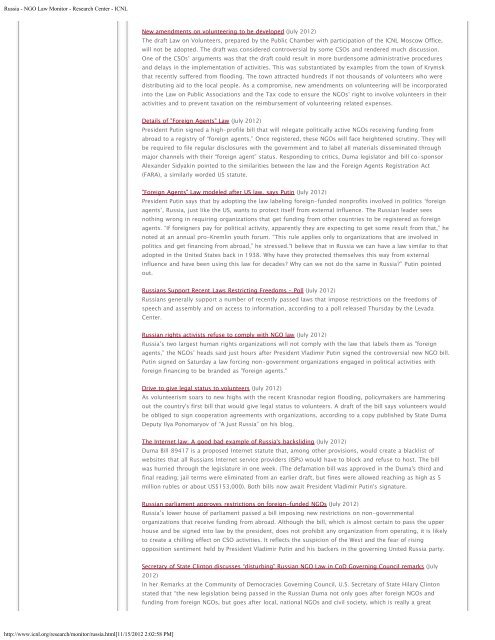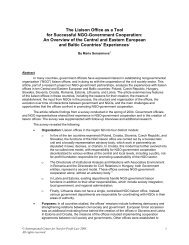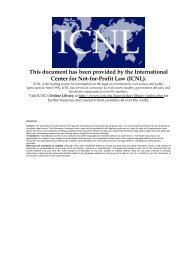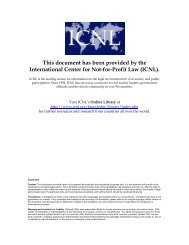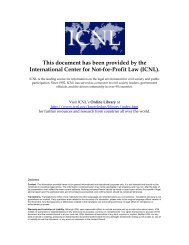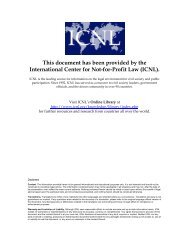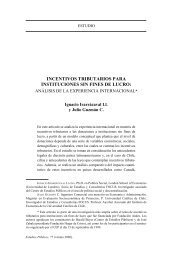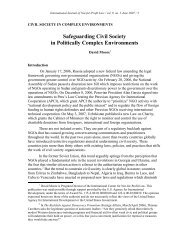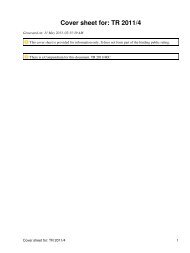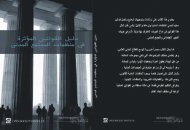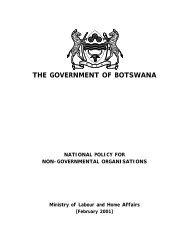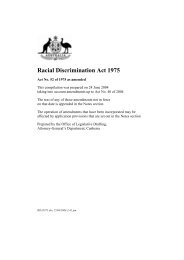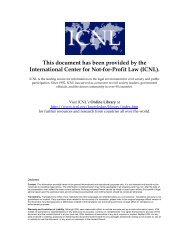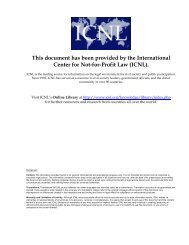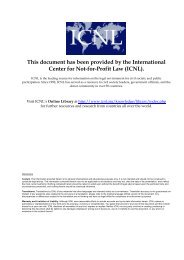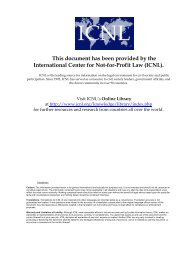Russia - NGO Law Monitor - Research Center - ICNL
Russia - NGO Law Monitor - Research Center - ICNL
Russia - NGO Law Monitor - Research Center - ICNL
Create successful ePaper yourself
Turn your PDF publications into a flip-book with our unique Google optimized e-Paper software.
<strong>Russia</strong> - <strong>NGO</strong> <strong>Law</strong> <strong>Monitor</strong> - <strong>Research</strong> <strong>Center</strong> - <strong>ICNL</strong><br />
http://www.icnl.org/research/monitor/russia.html[11/15/2012 2:02:58 PM]<br />
New amendments on volunteering to be developed (July 2012)<br />
The draft <strong>Law</strong> on Volunteers, prepared by the Public Chamber with participation of the <strong>ICNL</strong> Moscow Office,<br />
will not be adopted. The draft was considered controversial by some CSOs and rendered much discussion.<br />
One of the CSOs’ arguments was that the draft could result in more burdensome administrative procedures<br />
and delays in the implementation of activities. This was substantiated by examples from the town of Krymsk<br />
that recently suffered from flooding. The town attracted hundreds if not thousands of volunteers who were<br />
distributing aid to the local people. As a compromise, new amendments on volunteering will be incorporated<br />
into the <strong>Law</strong> on Public Associations and the Tax code to ensure the <strong>NGO</strong>s’ right to involve volunteers in their<br />
activities and to prevent taxation on the reimbursement of volunteering related expenses.<br />
Details of "Foreign Agents" <strong>Law</strong> (July 2012)<br />
President Putin signed a high-profile bill that will relegate politically active <strong>NGO</strong>s receiving funding from<br />
abroad to a registry of “foreign agents.” Once registered, these <strong>NGO</strong>s will face heightened scrutiny. They will<br />
be required to file regular disclosures with the government and to label all materials disseminated through<br />
major channels with their “foreign agent” status. Responding to critics, Duma legislator and bill co-sponsor<br />
Alexander Sidyakin pointed to the similarities between the law and the Foreign Agents Registration Act<br />
(FARA), a similarly worded US statute.<br />
"Foreign Agents" <strong>Law</strong> modeled after US law, says Putin (July 2012)<br />
President Putin says that by adopting the law labeling foreign-funded nonprofits involved in politics ‘foreign<br />
agents’, <strong>Russia</strong>, just like the US, wants to protect itself from external influence. The <strong>Russia</strong>n leader sees<br />
nothing wrong in requiring organizations that get funding from other countries to be registered as foreign<br />
agents. “If foreigners pay for political activity, apparently they are expecting to get some result from that,” he<br />
noted at an annual pro-Kremlin youth forum. “This rule applies only to organizations that are involved in<br />
politics and get financing from abroad,” he stressed.“I believe that in <strong>Russia</strong> we can have a law similar to that<br />
adopted in the United States back in 1938. Why have they protected themselves this way from external<br />
influence and have been using this law for decades? Why can we not do the same in <strong>Russia</strong>?” Putin pointed<br />
out.<br />
<strong>Russia</strong>ns Support Recent <strong>Law</strong>s Restricting Freedoms - Poll (July 2012)<br />
<strong>Russia</strong>ns generally support a number of recently passed laws that impose restrictions on the freedoms of<br />
speech and assembly and on access to information, according to a poll released Thursday by the Levada<br />
<strong>Center</strong>.<br />
<strong>Russia</strong>n rights activists refuse to comply with <strong>NGO</strong> law (July 2012)<br />
<strong>Russia</strong>’s two largest human rights organizations will not comply with the law that labels them as "foreign<br />
agents,” the <strong>NGO</strong>s’ heads said just hours after President Vladimir Putin signed the controversial new <strong>NGO</strong> bill.<br />
Putin signed on Saturday a law forcing non-government organizations engaged in political activities with<br />
foreign financing to be branded as "foreign agents."<br />
Drive to give legal status to volunteers (July 2012)<br />
As volunteerism soars to new highs with the recent Krasnodar region flooding, policymakers are hammering<br />
out the country's first bill that would give legal status to volunteers. A draft of the bill says volunteers would<br />
be obliged to sign cooperation agreements with organizations, according to a copy published by State Duma<br />
Deputy Ilya Ponomaryov of “A Just <strong>Russia</strong>” on his blog.<br />
The Internet law: A good bad example of <strong>Russia</strong>'s backsliding (July 2012)<br />
Duma Bill 89417 is a proposed Internet statute that, among other provisions, would create a blacklist of<br />
websites that all <strong>Russia</strong>ns Internet service providers (ISPs) would have to block and refuse to host. The bill<br />
was hurried through the legislature in one week. (The defamation bill was approved in the Duma's third and<br />
final reading; jail terms were eliminated from an earlier draft, but fines were allowed reaching as high as 5<br />
million rubles or about US$153,000). Both bills now await President Vladimir Putin's signature.<br />
<strong>Russia</strong>n parliament approves restrictions on foreign-funded <strong>NGO</strong>s (July 2012)<br />
<strong>Russia</strong>’s lower house of parliament passed a bill imposing new restrictions on non-governmental<br />
organizations that receive funding from abroad. Although the bill, which is almost certain to pass the upper<br />
house and be signed into law by the president, does not prohibit any organization from operating, it is likely<br />
to create a chilling effect on CSO activities. It reflects the suspicion of the West and the fear of rising<br />
opposition sentiment held by President Vladimir Putin and his backers in the governing United <strong>Russia</strong> party.<br />
Secretary of State Clinton discusses “disturbing” <strong>Russia</strong>n <strong>NGO</strong> <strong>Law</strong> in CoD Governing Council remarks (July<br />
2012)<br />
In her Remarks at the Community of Democracies Governing Council, U.S. Secretary of State Hilary Clinton<br />
stated that “the new legislation being passed in the <strong>Russia</strong>n Duma not only goes after foreign <strong>NGO</strong>s and<br />
funding from foreign <strong>NGO</strong>s, but goes after local, national <strong>NGO</strong>s and civil society, which is really a great


